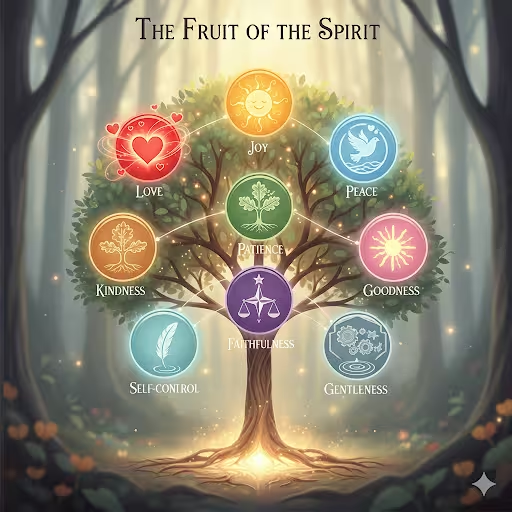The Ultimate Guide to the Fruit of the Spirit: God’s Blueprint for Transformation
Have you ever wondered why some Christians seem to radiate an unshakable peace and lasting joy, even when navigating the toughest seasons of life? The answer often lies in the fruit of the Spirit, a concept straight from Scripture that fundamentally shapes how we live out our faith. I see the fruit of the Spirit as God’s blueprint for character transformation, demonstrating the difference between a life lived by human effort and one transformed by divine grace.
The fruit of the Spirit represents the beautiful, interconnected qualities the Holy Spirit produces in the lives of those who believe. The Apostle Paul lists them in Galatians 5:22-23: “But the fruit of the Spirit is love, joy, peace, patience, kindness, goodness, faithfulness, gentleness, self-control; against such things there is no law.” This passage is much more than a simple list; it is a profound theological statement and a call to live differently.
In a world full of chaos, understanding the fruit of the Spirit can guide us toward godly living, spiritual maturity, and genuine freedom from sin. This article will serve as your comprehensive guide to unlocking the depth of this vital teaching, helping you grow closer to Christ and live a life that truly reflects His character.
What is the Fruit of the Spirit? (Galatians 5:22-23)
The fruit of the Spirit is God’s singular response to the problem of the flesh. In Galatians 5, Paul contrasts the works of the flesh (sins like immorality, discord, and envy) with the fruit of the Spirit. Notice that Paul uses the singular word “fruit” (karpos in Greek) even though he lists nine distinct qualities. This emphasizes that these qualities are not independent virtues you pick and choose but a unified product of the Spirit’s work. They are meant to be seen and grown together as a whole.
Fruit vs. Gifts: A Crucial Distinction
When studying the fruit of the Spirit, it is essential to distinguish it from the gifts of the Spirit. This distinction often confuses new believers.
- Gifts of the Spirit (Charismata) are abilities given by God for ministry and service (e.g., teaching, healing, prophecy). They are external manifestations of power used for the body of Christ. Not every believer has every gift.
- Fruit of the Spirit (Karpos) is a display of Christian character and maturity (e.g., love, peace, self-control). It is the internal transformation that God desires for all believers.
The gifts of the Spirit show what God can do through you; the fruit of the Spirit shows what God is doing in you. True spiritual maturity is measured not by how powerful your gifts are, but by how evident the fruit of the Spirit is in your daily life.
The Context: Life Under Law vs. Life in the Spirit
Paul introduces the fruit of the Spirit to resolve the central theological conflict in Galatians: living under the Law versus living by the Spirit. He argues that trying to live a righteous life by following legalistic rules (the Law) is futile, as the Law only serves to highlight sin. For a scholarly analysis of Paul’s view of religion and ethics, one must understand that faith works through love. True freedom and righteousness come only through the Holy Spirit. This concept is foundational to understanding the fruit of the Spirit.
When we “walk in the Spirit” (Galatians 5:16), we naturally produce the fruit, because the Spirit’s nature is love, joy, and peace. This process is passive yet intentional—the Spirit is the source, but we must choose to cooperate with Him. The phrase “against such things there is no law” means that no law can condemn these virtues, and no law is needed to compel them, as they are the spontaneous result of God’s life within us.
The Core Cluster of Relationship (Love, Joy, Peace)
The first three qualities of the fruit of the Spirit form a foundational cluster. They describe the essential inner relationship a believer has with God and serve as the source from which all other qualities flow.
Love (αγαπη, agapē): The Foundation
Love is listed first because it is the preeminent quality and the theological source of all the other eight fruits. If God is love (1 John 4:8), then the fruit of the Spirit must first and foremost be love. This is the divine, unconditional, and self-sacrificial agapē love. It is a choice and an act of the will, regardless of the recipient’s merit.
- Scriptural Connection: All the Law and the Prophets hang on the command to love God and love your neighbor (Matthew 22:37-40). The very core of Christian existence is an expression of love.
- Theological Significance: Without agapē, Paul states in 1 Corinthians 13, all spiritual gifts, knowledge, and even self-sacrifice are worthless. The other eight fruits are simply different facets of love in action. To fully grasp love one must answer the question, what does the Bible say about love.
Joy (χαρα, chara): The Inner Well-being
Joy is not the same as happiness. Happiness is circumstantial, dependent on things happening well. Joy (chara) is a deep-seated, internal well-being that is independent of external circumstances. It is the spiritual delight that comes from knowing God.
- Scriptural Connection: Paul often wrote about joy while suffering imprisonment (Philippians 4:4). This shows that the fruit of the Spirit is a supernatural quality. Biblical joy is rooted in the unchanging truths of God’s sovereignty, goodness, and salvation.
- Practical Application: This fruit of the Spirit allows a believer to praise God even in the toughest trials. It demonstrates to the world that our hope is not in earthly circumstances but in Christ alone.
Peace (ειρηνη, eirēnē): The Harmony
Peace (eirēnē) is a state of spiritual harmony and wholeness. It includes “peace with God” (Romans 5:1), meaning reconciliation from sin, and the “peace of God” (Philippians 4:7), the inner tranquility that guards our hearts and minds against anxiety.
Practical Application: This fruit of the Spirit is the antidote to the anxiety and fear that dominate the current culture. It allows a believer to rest in the conviction that God is sovereign, enabling them to make calm, discerning decisions.
Scriptural Connection: Jesus is called the Prince of Peace (Isaiah 9:6). The peace that is the fruit of the Spirit is a direct result of dwelling in Christ and trusting His control over our lives.
The Cluster of Conduct (Patience, Kindness, Goodness)
The second group of qualities in the fruit of the Spirit defines how a believer interacts with and treats others, particularly when faced with external pressure, disagreement, or need. This cluster describes Christian conduct in the world.
Patience (μακρoθυμια, makrothymia): The Longsuffering
Patience (makrothymia) means “long-suffering.” It is the ability to endure injury, provocation, or delay without retaliation, resentment, or giving up hope. It is a reflection of God’s own patience with humanity.
- Theological Significance: This fruit of the Spirit shows how long God is willing to wait for repentance (2 Peter 3:9). For us, it is the deliberate refusal to seek immediate revenge or become irritable when others are difficult.
- Practical Application: This is the quality necessary for enduring suffering and for dealing graciously with frustrating people. It allows us to give others the same grace and time for growth that God has given us.
Kindness (χρηστoτηζ, chrēstotēs): The Gentle Act
Kindness (chrēstotēs) is the amiable, gentle disposition that shows active benevolence toward others. It is the tangible expression of love and patience, going beyond passive endurance to actively seeking the good of others.
- Scriptural Connection: This fruit of the Spirit reflects God’s own disposition toward us, where His goodness leads us to repentance (Romans 2:4). Our kindness should mirror God’s own goodness.
- Practical Application: This quality manifests in everyday courtesy, thoughtfulness, and being helpful. It means being useful to others in their need and speaking soft, encouraging words.
Goodness (αγαθωσuνη, agathōsynē): The Moral Integrity
Goodness (agathōsynē) is moral excellence and integrity. It is an active desire to pursue and practice what is morally upright. While kindness is gentle in action, goodness is often bolder, actively confronting and correcting evil when necessary.
Practical Application: This quality manifests in zeal for the truth, hatred of evil, and the willingness to take righteous action. It is the moral backbone necessary to live a life separated from the world’s corruption.
Theological Significance: This fruit of the Spirit reflects God’s holiness and moral perfection. It is not just the absence of sin, but the positive presence of virtuous conduct.
The Cluster of Self-Mastery (Faithfulness, Gentleness, Self-Control)
The final group of qualities in the fruit of the Spirit focuses on inward character, reliability, and the necessary discipline to sustain a life led by the Spirit. This cluster is crucial for self-mastery and spiritual warfare.
Faithfulness (πιστις, pistis): The Reliability
Faithfulness (pistis) means dependability, trustworthiness, and loyalty. It refers both to our steadfast belief in God and to our steadfast reliability in keeping our commitments to others.
- Theological Significance: This fruit of the Spirit is a reflection of God’s absolute trustworthiness. He is faithful even when we are faithless (2 Timothy 2:13). Our faithfulness is a witness to His character.
- Practical Application: This is the quality that makes a person reliable in marriage, work, and ministry. It means consistently living out our stated beliefs and promises.
Gentleness (πραu¨της, prautēs): The Strength Under Control
Gentleness (prautēs) is often translated as “meekness.” However, it is not weakness. Biblical gentleness is strength under control. It is the willingness to forgo personal rights and power for the sake of the Gospel and others.
- Scriptural Connection: Jesus described himself as gentle and humble in heart (Matthew 11:29). This fruit of the Spirit demonstrates humility and teachability, allowing us to receive criticism and instruct others without being harsh.
- Practical Application: This quality is necessary for restoring a brother or sister caught in sin (Galatians 6:1) and for demonstrating patience during persecution.
Self-Control (εγκρατεια, enkrateia): The Discipline
Self-Control (enkrateia) is the final fruit of the Spirit, and in many ways, the most active. It is the necessary discipline and restraint used to govern one’s passions, desires, and appetites.
Practical Application: This quality governs our consumption of food, media, and wealth. It is the spiritual discipline that protects the believer from falling into temptation.
Theological Significance: It is the quality that allows us to crucify the flesh daily (Galatians 5:24). This fruit of the Spirit is essential for maintaining moral purity and avoiding the destructive works of the flesh.
Practical Steps to Cultivate the Fruit of the Spirit
The fruit of the Spirit is grown by the Spirit, but this does not mean the believer is passive. We are called to “walk in the Spirit” (Galatians 5:16). Cultivation requires intentional effort and surrender.
Walking in the Spirit: The Daily Choice
“Walking in the Spirit” is a continuous, daily choice to rely on the Holy Spirit’s power rather than our own strength or the compulsions of the flesh. The Greek word for “walk” (peripateō) implies a constant pattern of life.
- Focus on the Word: The Spirit uses the Word to transform us (2 Timothy 3:16). Daily immersion in Scripture provides the spiritual nutrition for the fruit of the Spirit to grow.
- Yield to the Spirit’s Leading: At every point of decision—how to respond to anger, how to spend time, how to speak—we must choose to follow the Spirit’s promptings over the flesh’s desires.
- The Importance of Prayer: Consistent prayer is essential for dependence. We cannot produce the fruit of the Spirit without constantly asking for God’s enabling grace.
Crucifying the Flesh: The Negative Necessity
Cultivating the fruit of the Spirit also requires the negative necessity: deliberately resisting and putting to death the desires of the flesh. “The works of the flesh are evident: sexual immorality, impurity, sensuality, idolatry, sorcery, enmity, strife, jealousy, fits of anger, rivalries, dissensions, divisions, envy, drunkenness, orgies, and things like these.” (Galatians 5:19-21). They are in direct opposition to the fruit of the Spirit. We must actively resist them.
Putting to Death: Through the Spirit’s power, actively choose the corresponding fruit. When tempted to anger, choose patience. When tempted to worry, choose peace. This is the ongoing process of sanctification.
Identifying the Works: Honestly identify the areas where the works of the flesh are most active in your life. This stark inventory shows that the works of the flesh are not merely isolated sins, but a deep-seated way of life defined by self-worship and discord. They are categorized into three main areas:
- Relational Sins: This is the longest and most destructive category: enmity, strife, jealousy, anger, dissensions, and divisions. These sins actively destroy community and fellowship, putting self-will above all others.
- Sexual Sins: Immorality, impurity, and sensuality describe the degradation of personal holiness and boundaries.
- Religious Sins: Idolatry and sorcery (or witchcraft) deal with false worship and seeking spiritual power outside of the one true God.
Watch this sermon by Bruce Zachary, teaching pastor at Calvary Nexus in Camarillo, CA, for more insight.
The profound difference between the works of the flesh and the fruit of the Spirit is that the former are works (human effort leading to chaos), and the latter is fruit (divine transformation leading to character). As the video noted, the fruit of the Spirit is not produced by self-discipline or controlling your emotion, but is a byproduct of relationship with Christ. This distinction emphasizes that the fruit of the Spirit is a miraculous, supernatural change, not a mere moral effort.
The conflict is real, but the victory is certain. We’ve seen the contrast between the chaos of the flesh and the beauty of the Spirit’s product. Now, the final step in the study of the fruit of the Spirit is understanding how to live out this victory daily by actively surrendering to the Spirit’s power.
Conclusion: The Evidence of a Transformed Life
The fruit of the Spirit is God’s divine standard for every believer. It is the tangible evidence of a life that has been transformed by Jesus Christ. These nine qualities—love, joy, peace, patience, kindness, goodness, faithfulness, gentleness, and self-control—are not separate achievements but a unified character. They mark a life that is truly walking free from sin.
Understanding the fruit of the Spirit is essential for true Bible scholarship and practical Christian living. It moves our faith from a mere intellectual assent to a powerful, visible reality that glorifies God and draws others to Him.
We encourage you to make the daily choice to walk in the Spirit, allowing Him to cultivate this divine character in you. This process is the ultimate demonstration that your life is truly His.
- To understand the foundations of faith and how the fruit of the Spirit relates to all of theology, visit our pillar article on 10 Essential Bible Topics.



